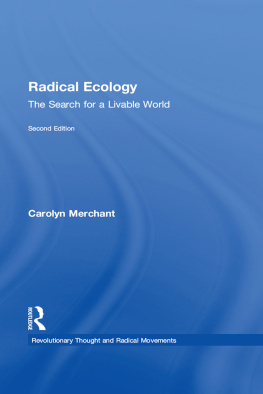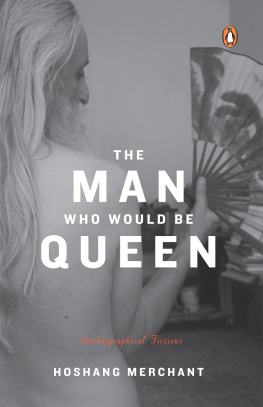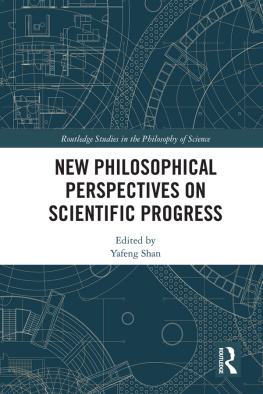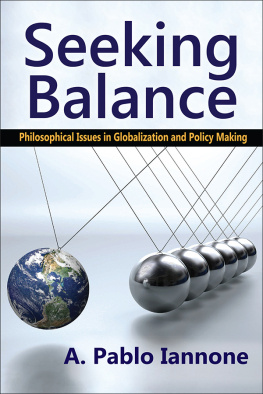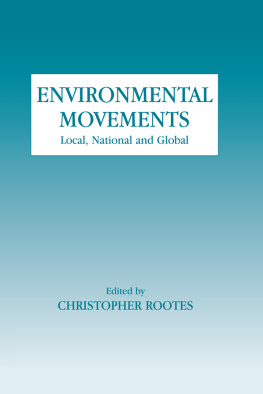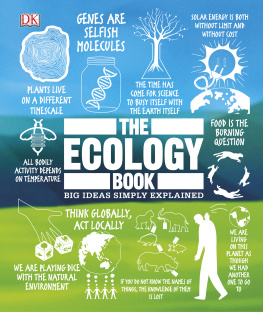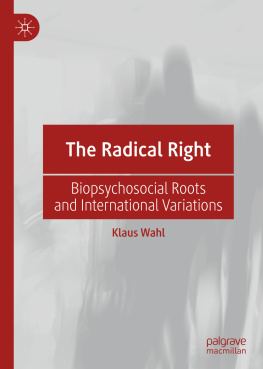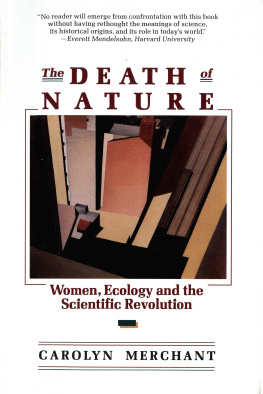Radical Ecology
Revolutionary Thought/
Radical Movements
A book series edited by Roger Gottlieb
Other Books in the Series:
The Socialist Tradition: From Crisis to Decline
Carl Boggs
The Gay and Lesbian Liberation Movement
Margaret Cruikshank
Marxism 18441990: Origins, Betrayal, Rebirth
Roger S. Gottlieb
Black Movements in America
Cedric J. Robinson
Women in Movement: Feminism and Social Action
Sheila Rowbotham
Radical Ecology
The Search for a Livable World
SECOND EDITION
CAROLYN MERCHANT

Published in 2005 by
Routledge
Taylor & Francis Group
711 Third Avenue
New York, NY 10017
| Published in Great Britain by
Routledge
Taylor & Francis Group
2 Park Square
Milton Park, Abingdon
Oxon OX14 4RN |
2005 by Taylor & Francis Group, LLC
Routledge is an imprint of Taylor & Francis Group
International Standard Book Number-10: 0-415-93577-6 (Hardcover) 0-415-93578-4 (Softcover)
International Standard Book Number-13: 978-0-415-93577-7 (Hardcover) 978-0-415-93578-4 (Softcover)
Library of Congress Card Number 2005009520
No part of this book may be reprinted, reproduced, transmitted, or utilized in any form by any electronic, mechanical, or other means, now known or hereafter invented, including photocopying, microfilming, and recording, or in any information storage or retrieval system, without written permission from the publishers.
Trademark Notice: Product or corporate names may be trademarks or registered trademarks, and are used only for identification and explanation without intent to infringe.
Library of Congress Cataloging-in-Publication Data
Merchant, Carolyn.
Radical ecology: the search for a livable world / Carolyn Merchant.-- 2nd ed. p. cm. -- (Revolutionary thought/radical movements)
Includes bibliographical references and index.
ISBN 0-415-93577-6 (hardcover: alk. paper) -- ISBN 0-415-93578-4 (pbk.: alk. paper)
1. Ecology-Philosophy. 2. Ecology-Political aspects. 3. Environmental ethics. 4. Ecofeminism.
I. Title. II. Series.
QH540.5.M48 2005
304.2--dc22
2005009520

| Visit the Taylor & Francis Web site at http://www.taylorandfrancis.com
and the Routledge Web site at
http://www.routledge-ny.com |
To the Earth
CONTENTS
LIST OF FIGURES AND TABLES
SERIES EDITOR'S PREFACE
This book, like its companions in the Revolutionary Thought/Radical Movements series, challenges contemporary society and civilization.
Perhaps the heart of this challenge is a deeply felt anguish and outrage over the sheet magnitude of human sufferingalong with the terrible frustration of knowing that much of this suffering could be avoided. Radicals refuse to blame homelessness and starvation, the rape of women and abuse of children, the theft of labor and land, hope and self-respect on divine Providence or unchangeable human nature. Rather, they believe that much of it comes from injustice, exploitation, violence, and organized cruelty that can be eradicated. If we drastically alter our arrangements in the direction of equality, justice, and human fulfillment, the brutal realities of the present can give way to vastly increased material security, social harmony, and self-realization.
Philanthropists and political reformers share radicals concern for human suffering. But unlike reformers and philanthropists, radicals and revolutionaries address whole systems of injustice. In these systems, particular groups are humiliated, denied rights, subject to unjust control. The few become rich while the many suffer from poverty or economic insecurity. The select get privileges while millions learn submission or humiliation. We are conditioned to false needs for endless consumption while nature is poisoned. The powers-that-be profit from these systems, common sense enshrines them as necessary, and ideological mystification obscures their origin and nature by blaming the victims. Responses to people's pain, if they are to be truly and lastingly effective, must be aimed at the system: at capitalism, sexism, racism, imperialism, homophobia, the bureaucratic state, and the domination of nature.
Governments and economies, families and culture, science and individual psychologyall are shaped by these systems of domination and exclusion. That is why the radical ideal goes beyond piecemeal improvements to a Utopian vision; and tries to realize that vision in everyday struggles for a fair distribution of power, human dignity, and a livable environment. Revolutionaries have argued that a modern economy can be democratically controlled and oriented to human needs rather than profit; can do without vast differences of wealth and power; and can preserve rather than destroy the earth. Radicals claim that in a true democracy ordinary men and women would help shape the basic conditions which affect their lives: not just by an occasional trip to the ballot box, but by active involvement in decisions about political and economic life.
How will these sweeping changes take place? Revolutionaries have offered many answersfrom large political parties to angry uprisings, from decentralized groups based in consciousness-raising to international organizations. In any case, however, the conception of radicalism which informs the series stipulates that authentic revolutionary change requires the self-action of sizable groups of people, not the self-promotion of a self-proclaimed revolutionary elite. The only way to prevent the betrayal of the revolution by a privileged bureaucracy is to base radical politics on free discussion, mutual respect, and collective empowerment from the beginning. This is one of the clearest and most painful lessons from the history of communism.
Of course much of this sounds good on paper. Yet it may beas many have claimedthat radical visions are really unrealistic fantasies. However, if we abandon these visions we also abandon human life to its current misery, with little to hope for but token reforms. Radicals reject this essentially cynical realism, opting for a continuing faith in the human capacity for a fundamentally different and profoundly liberating form of life.
In fact, people have always dreamed of a better world. Yet it is only since the late eighteenth century that organized groups developed a systematic theoretical critique of social life; and tried to embody that critique in mass political movements designed to overthrow the existing order of economic ownership and political control. American revolutionaries claimed that All men are endowed with certain inalienable rights. The French revolution demanded liberty, equality, fraternity.
Since then Marxist, socialist, feminist, national liberation, civil rights, gay and lesbian liberation, and ecology movements have been born. Each movement utilized some of the accomplishments of its predecessors, criticized the past for its limitations, and broke new ground. Revolutionary Thought/Radical Movements will focus on the theory and practice, successes and failures, of these movements.
While the series authors are part of the radical tradition, we are painfully aware that this tradition has committed grave errors and at times failed completely. The communism of the Eastern bloc, while maintaining certain valuable social welfare programs, combined economic inefficiency, brutal tyranny, and ecological devastation. Many of us who took to the streets in the 1960s joined arrogance with idealism, self-indulgence with utopian hopes. Much of contemporary radical or socialist feminism fails to reach beyond a circle of the already converted.

